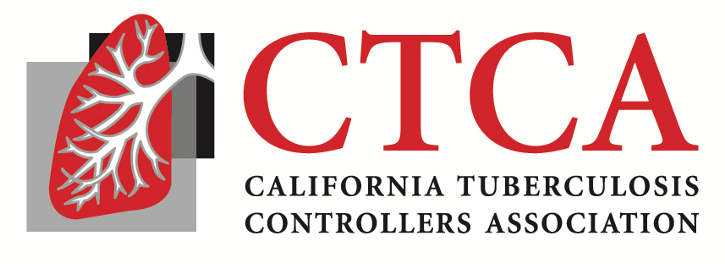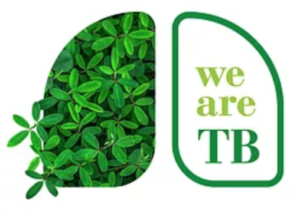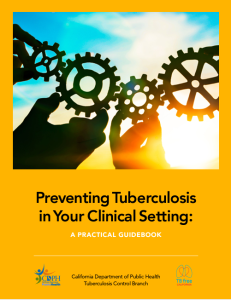For Medical Providers
Who To Test:
Persons with a risk for TB.
Prioritize persons with risks for progression.
If health system resources do not allow for testing of all persons from countries with elevated TB rates, prioritize those with at least one of the following medical risks for progression:
– diabetes mellitus
– smoker within past 1 year
– leukemia or lymphoma
– silicosis
– cancer of head or neck
– intestinal bypass/gastrectomy
– chronic malabsorption
– body mass index ≤ 20
– history of chest x-ray findings suggestive
of previous/inactive TB (no prior treatment). Includes fibrosis or non-calcified nodules, but does not include
In addition to LTBI testing, evaluate for active TB disease.
AB2132 Law Effective, 1-1-25:
Primary care providers in California are required to evaluate their adult patients for tuberculosis (TB). To help providers implement this initiative, CTCA adapted CDPH TB Free California guidance into this two page guide, PREVENTING TB DISEASE IN 4 STEPS.
CalMatters bill summary
CDPH Medical Board Letter_AB2132 and Board of Registered Nursing Letter_AB2132
TB Information for Primary Care Providers from:
California Department of Public Health, TB Free California: https://www.cdph.ca.gov/Programs/CID/DCDC/Pages/TB_Provider_Resources.aspx
Centers for Disease Control and Prevention, Think Test Treat: https://www.cdc.gov/think-test-treat-tb/site.html#hcp
TB Risk Assessments:
The California Department of Public Health (CDPH) Tuberculosis Control Branch (TBCB), and the Curry International Tuberculosis Center (CITC) worked with CTCA volunteers to create the four risk assessments. The risk assessments identify those in California at risk for TB infection which can become TB disease. We aim to find and treat TB infection before TB disease develops.
A 5/6/20 update to the California Tuberculosis School Staff and Volunteer Risk Assessment, User Guide, Certificate of Completion, and FAQs (PDF) clarifies that telehealth/remote visits are an option for face to face administration of this Risk Assessment.
Preventing Tuberculosis in Your Clinical Setting:
A Practical Guidebook
Staff from the TB Free California initiative, a project of the California Department of Public Health, produced this Guidebook to share information with primary care clinics and other partners who endeavor to improve TB prevention among their patients. The authors’ intentions are to assist clinics to scale-up and improve their latent TB infection (LTBI) programmatic and care activities as well as to engage with their community-based partners for support. These efforts will result in successful TB prevention outcomes, ultimately contributing to the elimination of TB in California.
Adobe Acrobat is the recommended application for viewing the Guidebook and its web features. Acrobat Reader can be downloaded for free at: https://www.adobe.com/acrobat/pdf-reader.html.
Find out more about the TB Free California initiative and access their many resources for patients and providers at: https://www.cdph.ca.gov/Programs/CID/DCDC/Pages/TB-Free-California.aspx.
TB Screening Matters
One out of four people alive today is infected with TB, globally. If exposed to infectious TB, anyone can get infected and progress to disease. Most TB disease is diagnosed in private medical settings with city/county public health departments providing case management support and contact investigations to identify related TB infections and disease. Private providers, working with public health personnel provide prevent large and ongoing outbreaks of TB.
The CDC launched the Think, Test, Treat campaign materials this year to help providers preventing active TB in their patient populations.
In May 2023, the US Preventive Services Task Force again recommends screening for LTBI in populations at increased risk. https://www.uspreventiveservicestaskforce.org/uspstf/recommendation/latent-tuberculosis-infection-screening
On September 6, 2016, the US Preventive Services Task Force made an initial recommendation for Screening for Latent Tuberculosis Infection in Adults.
About BCG:
BCG, or Bacille Calmette-Guérin, is a vaccine for TB given to many born outside of the United States.
TB blood tests (interferon-gamma release assays or IGRAs) are recommended for those with a history of BCG vacinnation.
BCG vaccine may cause a positive reaction to the TB skin test, complicating decisions about treatment. Despite this potential for BCG to interfere with test results, the TB skin test (TST) is not contraindicated for persons who have been vaccinated with BCG. The presence or size of a TST reaction in these persons does not predict whether BCG will provide any protection against TB disease. Furthermore, the size of a TST reaction in a BCG-vaccinated person is not a factor in determining whether the reaction is caused by latent TB infection (LTBI) or the prior BCG vaccination.
More on who to test and BCG
Links to Additional Resources on CTCA.ORG
CDPH-CTCA Joint Guidelines
CA TB Legal Resources
Additional Resources
If TB test is positive and TB disease is ruled out, LTBI treatment may be recommended. Consult your public health department TB Control Program.
Links to Curry International TB Center Resources
Calipers for TB Skin Test Reading



